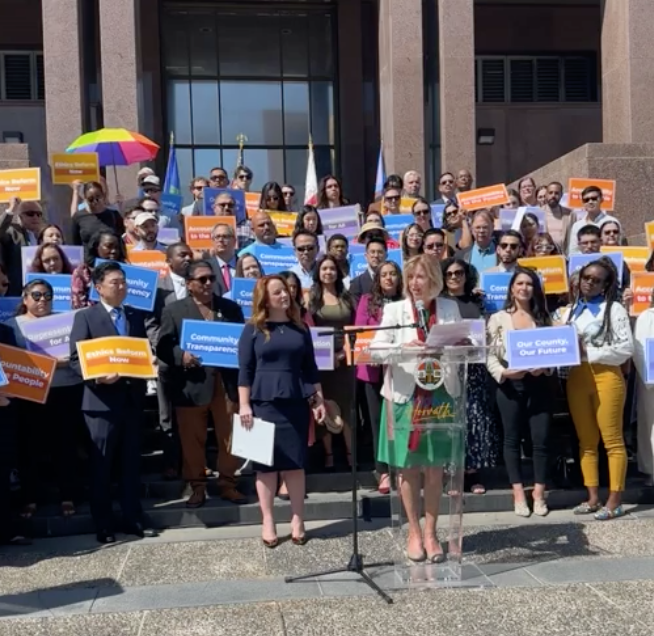Los Angeles County Supervisors Lindsey Horvath and Janice Hahn unveiled an ambitious proposal on Wednesday to transform county government by expanding the Board of Supervisors from its current five members to nine.
This sweeping reform package is being touted as the most significant change to the county’s governance in over a century.
“The last time the county meaningfully changed its form of governance was in 1912, before women had the right to vote, far before the end of segregation, and well before comprehensive labor rights took hold,” Horvath said via Fox11.
She emphasized that this reform is crucial for a government serving 10 million residents.
The proposal, which also includes the establishment of an independent ethics commission and the election of the county CEO, will be presented to the full board next week. Because the proposed changes require amending the County Charter, they will need to be placed on the November ballot for voter approval.
Supervisors Horvath and Hahn highlighted that the expansion aims to improve representation, efficiency and transparency.
“Today, five elected supervisors serve the most populous county in the nation, each representing 2 million constituents. Now is the time to reform Los Angeles County’s form of government to be responsive to our region’s greatest challenges,” they said in a statement.
Incorporating an elected CEO is another key aspect of the proposal.
Horvath explained, “Separating out the executive authority from the legislative body is typical in most governments throughout the country, and this allows for accountability and a check and balance on the process.”
The supervisors noted that without an elected CEO, expanding the board could lead to less transparency.
Additional proposed reforms include a commission to review the County Charter every 10 years and the creation of a Department of Budget and Management and a county legislative analyst. The proposal also calls for annual open departmental budget hearings and a task force to oversee the implementation of the changes.
Addressing concerns about potential costs, Horvath assured taxpayers that the reforms would not result in higher taxes.
“This proposal requires that it does not come at additional cost to the taxpayers. With a $46 billion budget, I know we can do it,” she said.
Hahn reiterated, “We are not raising the taxes for this government reform.”
The need for reform has been underlined by the county’s pressing issues, such as homelessness and justice reform.
“We can no longer let a dated bureaucracy prevent us from more effectively addressing our homelessness crisis, making real progress on justice reform, or actualizing a government where Angelenos can meaningfully be at the decision-making table,” the supervisors said in their statement.
The concept of expanding the Board of Supervisors has been debated over the years but has never advanced.
However, Hahn expressed optimism about the current proposal, saying, “We’ve talked to voters, and they overwhelmingly support expanding the board in this moment.”
Should the board approve the proposal next week, an ordinance will be drafted with the proposed amendments to the County Charter. If voters endorse the changes in November, the new governance structure will be implemented gradually, with the CEO election set for 2028 and the board expansion scheduled for 2032. Supervisors Horvath and Hahn both stressed the significance of this potential shift, seeing it as an opportunity to modernize Los Angeles County’s governance for the 21st century.







